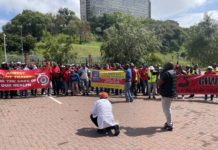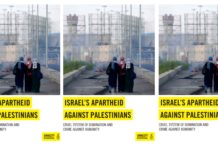A lot of the stories coming out of Palestine seem to be historical accounts of the conflict without an in-depth look at the people behind the stories. While the facts are very important, especially in the case of the conflict happening in Palestine, The Daily Vox takes a look at some of the stories about the people of Palestine and their lives and experience under occupation.
1. The Blue Between Sky and Water by Susan Abulhawa
No list of books on Palestine would be complete without one by Susan Abulhawa. The Palestinian-born writer is famously known for Mornings In Jenin, which traces the history of a Palestinian family from Jenin, a Palestinian city in the West Bank. Her latest offering, The Blue Between the Sky and Water also looks at the history of a family in Gaza. But the best part of the book is that it looks at the lives of different generations of Gazan women and how they go through everyday struggles while the yoke of Israeli oppression hangs over the heads.
The book is about the strong and fierce women whose stories shape their lives and the lives of those around them. Abulhawa writes:
“Stories matter. We are composed of our stories. The human heart is made of the words we put in it. If someone ever says mean things to you, don’t let those words go into your heart, and be careful not to put mean words in other people’s hearts.”
2. Gaza Writes Back: Short Stories edited by Refaat Alareer
This is an anthology of short stories written by young Gazans about their experiences of – especially during and following – Israel’s 2008-2009 offensive known as “Operation Cast Lead”. The book shows the lives and issues that the people of Gaza face on a day-to-day basis. The young people also reveal their hopes and dreams in the book, displaying their struggles but also their never-ending pursuit of justice.
One of the writers in the anthology, Refaat Alareer writes about their dreams of a free Palestine and what it will mean:
“There’s a Palestine that dwells inside all of us, a Palestine that needs to be rescued: a free Palestine where all people regardless of colour, religion, or race coexist; a Palestine where the meaning of the word “occupation” is only restricted to what the dictionary says rather than those plenty of meanings and connotations of death, destruction, pain, suffering, deprivation, isolation and restrictions that Israel has injected the word with.”
3. In Search of Fatima: A Palestinian Story by Ghada Karmi
This is an autobiographical story, which looks at the writer’s own experiences of displacement, loss, and nostalgia – which all happen during the major events of the Palestinian conflict such as the Nakba and the two intifadas. While the book looks at Karmi’s personal life experiences in particular, it does speak to the experiences of many other people in Palestine, as well as displaced Palestinians around the world and the formation of Israel caused a deeper loss of identity that couldn’t be so readily explained like the other losses.
Karmi was forced to leave Palestine after the occupation and she writes about leaving her birthplace:
“… We never set eyes on Fatima or our dog or the city we had known ever again. Like a body prematurely buried, unmourned without coffin or ceremony, our hasty untidy exit from Jerusalem was no way to have said goodbye to our home, our country and all that we knew and loved.”
4. Palestinian Walks: Forays into a Vanishing Landscape by Raja Shehadeh
In this semi-autobiographical book, Shehadeh, who is an passionate walker, takes the reader on his journey of six walks he took across Ramallah in Palestine over a period of 28 years. Shehadeh obviously loves Palestine and this is seen in his retellings of his walks. Yet, as the years go by, the reader sees how the place he loves is being destroyed and taken over by Israelis. These restrictions on something that the author enjoys doing seem like a metaphor for the greater oppression that Palestinians face in having been forcibly removed from their land.
Shehadeh’s deep love of wandering the hills of Ramallah and what it means to him can be seen in the poetic passages:
“A man going on a sarha [to wander], wanders aimlessly, not restricted by time and place, going where his spirit takes him to nourish his soul and rejuvenate himself. But not any excursion would qualify as a sarha. Going on a sarha implies letting go. It is a drug-free high, Palestinian style.”
5. The Book of Gaza: A City in Short Fiction edited by Atef Abu Saif and Asma al Ghul
This is another anthology of short stories from Gazan writers which has been translated into English. It also looks at the ordinary lives of people in Gaza, which has been called the world’s largest open-air prison. The book features many incredible writers from Arabic literature, as well a number of young female bloggers and activists. Like the other books, it deals with the bigger issue of the occupation but also the everyday lives of the people.
In one of the stories by Nayrouz Qarmout, we get the sense of how, despite the oppression the writers face, they still manage to find comfort in the familiarity of daily life. Qarmout writes:
“She gazed at his familiar smile and broken tooth. She remembered the hair clip, the walls of the neighbours’ house and the shade of the tree, then felt her heart take flight once more.”
If we’ve missed any books on our list, or you’ve read any of these books and have thoughts, tweet us or comment below.









